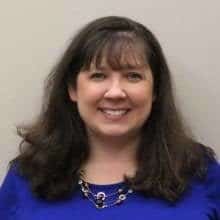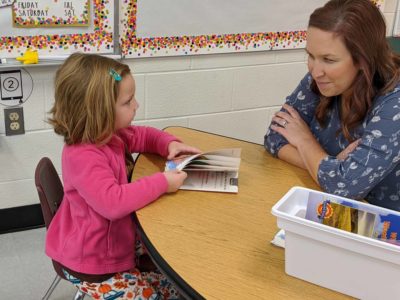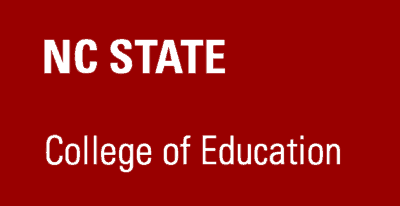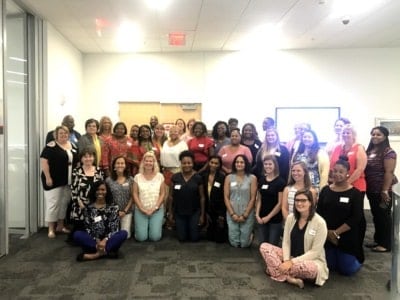

During the day, Lindsay Harper teaches kindergarten at Courtney Elementary School in Yadkinville, North Carolina. But one evening a week, she becomes the student as part of the Yadkin Wolfpack Literacy Partnership (YWLP) between the NC State College of Education and Yadkin County Schools (YCS) designed to improve reading proficiency in the district by helping teachers become literacy leaders.
Funded by a two-year, $575,000 grant from the Mebane Charitable Foundation in Mocksville, the Yadkin Wolfpack Literacy Partnership (YWLP) is using a cohort-based Master of Education program to enable 20 teachers with YCS to gain the expertise needed to effectively implement evidence-based literacy instruction, assessment, and intervention in the elementary grades — all expenses paid. The teachers who complete the program will receive a Master of Education and gain the knowledge needed to pursue advanced licensure in North Carolina as reading specialists. The partnership will also serve as a pilot test of a literacy leadership development model that can be replicated by other districts in North Carolina looking to cultivate transformative expertise in their schools.
“We want to see this partnership have a long-term impact in Yadkin County Schools,” said Dr. Dennis Davis, associate professor of literacy education at the NC State College of Education and the director of the program. “Imagine if ten years from now the YWLP teachers are still collaborating as a network of experts to model effective practices for their colleagues and inform district-level decisions related to early literacy learning. That is what we hope to see in the future – not just a group of teachers getting better at their craft, but also sticking together around the important cause of ensuring success for every child in the district.”
Larry Colbourne, president of the Foundation, can’t think of a better, more appropriate location for such an investment.
“The Mebane Foundation had been exploring opportunities for a partnership with NC State’s College of Education for more than a year,” said Colbourne. “When Dr. Davis approached me with this unique partnership opportunity, I immediately thought of Yadkin County Schools. The county is the epicenter for Unifi’s global operations, and much of the corpus of this foundation can be traced back to the wealth Mr. Mebane accumulated as a founder of Unifi. I can’t think of a better way to give back to Yadkin County.”
Fifteen members of the cohort are working in elementary schools, four in middle school, and one in high school. Although the project focuses on early literacy, the participation of middle school teachers and a high school teacher allows for literacy specialists to be available to help students outside of an elementary school setting, which has been historically uncommon, according to Davis.
The program officially launched on August 4 with an online orientation, hosted on Zoom, attended by all 20 members of the YWLP, the NC State team, and the instructors who are leading the fall courses.
“This is not the launch meeting we expected to have when we first envisioned the project prior to the COVID-19 pandemic, but it allowed us to share program goals, get everyone organized for their courses, and establish momentum for the year,” said Davis. “Fortunately, many of the project activities were designed to be implemented from a distance.
“The pandemic has definitely created challenges for everyone, especially teachers, but the members of the YWLP have proven to be tough and dedicated and continue to complete assignments and participate in their coursework.”
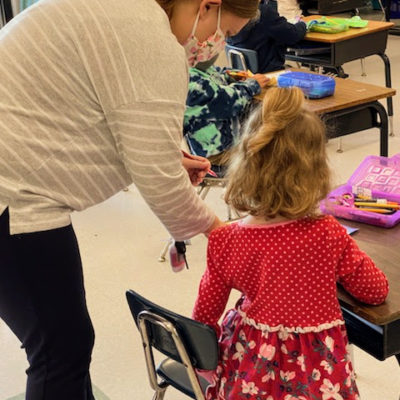

Teachers are taking two courses during the fall semester: Reading in the Elementary School and New Literacies and Media. The team meets together weekly in an online class and teachers complete additional learning activities independently.
“The students in the YWLP spent this semester understanding evidence-based literacy practices, research findings related to these practices, and how to incorporate these instructional practices into their own classrooms. Throughout the semester, the students learned, discussed, and reflected on their own practices related to overarching literacy concepts,” explained Dr. Jill Jones, YWLP instructor and teaching assistant professor at NC State.
“It has been exciting to hear the specific learnings that resonated with the teachers and how they are implementing these ideas in their classrooms. For example, after learning about vocabulary, the teachers began more intentional vocabulary instruction, selecting impactful words based on their learnings of this process, and developing students’ word awareness. As a culmination of the course and to promote the application of their learning, each teacher wrote a paper explaining their main learnings about literacy instruction, describing why these concepts are important, and how they will implement this knowledge in their future teaching,” Jones said.
“The new knowledge gained by these teachers in the YWLP cohort allows them to reflect on their own instructional practices and implement effective instruction to further develop their reading practices. We are building the teachers’ own knowledge of literacy with the goal of creating literacy leaders who intend to share this knowledge with colleagues in their schools and in the district. I have enjoyed hearing how these teachers are already sharing their new knowledge in discussions with colleagues, planning sessions, and more formal collaborations such as PLCs.”
Participating teachers are enthusiastic about what they have learned so far and how it is already benefiting them in their classroom.
“I am absolutely loving this program!” said Harper. “So far, the classes have gone well! Of course, I now drink multiple cups of coffee a day, but it is well worth it. The professors have been amazing. They have been supportive throughout the entire semester, and they have been patient with us as we are navigating teaching during a pandemic. I have learned so many new things already, and it is just the beginning! I look forward to continuing this program to benefit the students and Yadkin County Schools!”
“I am very excited about all the things I have learned so far from the Yadkin Wolfpack Literacy Partnership,” shared Hannah Cox, who teaches at Courtney Elementary School. “I am enjoying digging deeper into what vocabulary instruction should look like with my kindergarten students! I have also enjoyed using Twitter chats to have discussions with my peers and professor! It is a great way for us to collaborate!”
The training has been equally beneficial to the middle school teachers in the program.
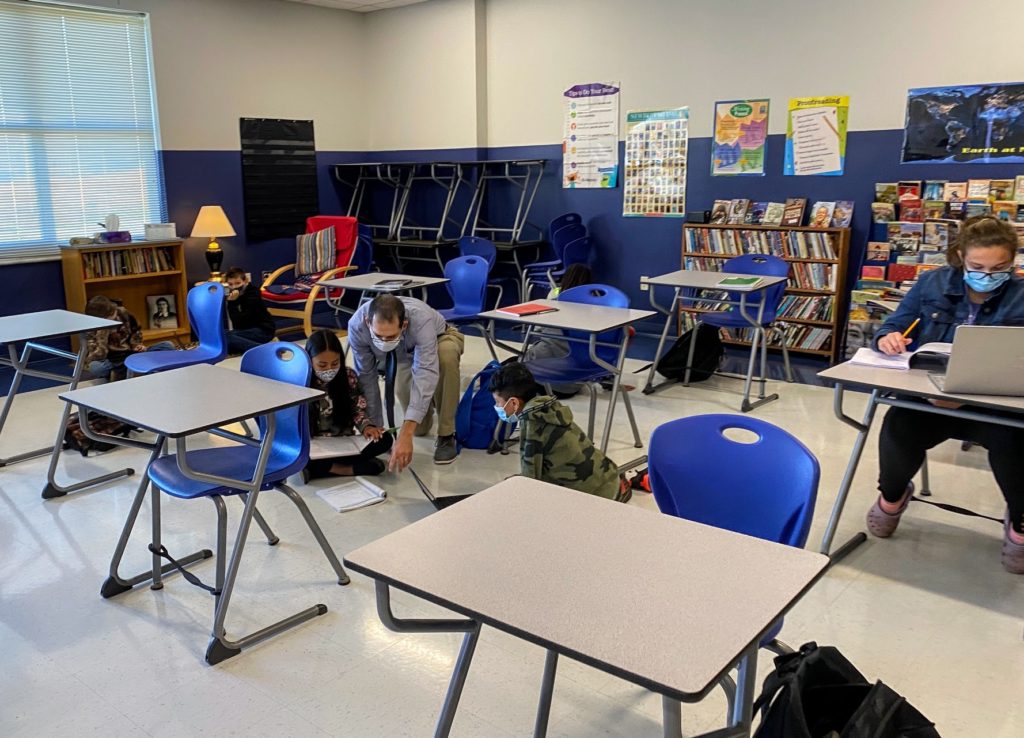

Jon Holleman, who teaches sixth-grade language arts at Starmount Middle School, said, “As a middle grades teacher, I did not receive many lessons on how to teach students to read. I knew comprehension strategies, but not the mechanics and science of reading. I chose to participate in the Yadkin Wolfpack Literacy Partnership to broaden my knowledge base and to help my struggling sixth-grade readers. This semester has been challenging, but that’s due to the unprecedented challenge (at least in our lifetimes) of teaching during a pandemic. However, our NC State professors have been quick to show us grace in working with us. They understand that these are challenging times for teaching, and have been wonderful in helping us to achieve a balance between work, school, and for many of us, parenting.”
“I have used several of the ideas from the course so far in my teaching, with plans to do more,” he added. “Just this week we did an assignment on giving feedback, where we thought back to a time when we received negative feedback and how that affected us. From that, we created a list of feedback rules that will help us stay positive while helping the students grow. This was powerful, and the assignment reminded us to be thoughtful in the words we choose. Also, the class has reinforced for me the importance of building the students’ vocabularies. The more vocabulary students know, the more they will be able to comprehend what they read.”
Dusti Gardner, who teaches at Forbush Middle School, agreed with Holleman, saying, “The YWLP has been such a wonderful program to be a part of so far. As a middle school teacher, I have already learned so many methods for helping my elementary-level students, as well as different literacy strategies to apply in my classroom to engage and support adolescent readers. My ultimate goal by being a member of this program is to build my knowledge in order to help my students grow into more confident and proficient readers.”
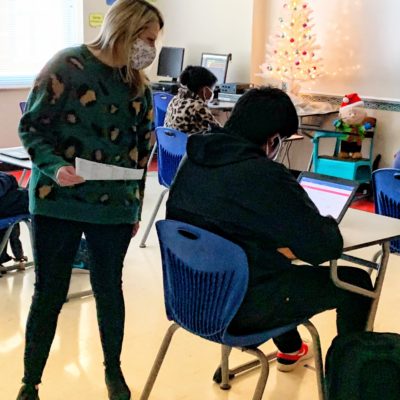

The teachers aren’t the only ones to receive training. School administrators will also play a role in the project through workshops that will help them better understand some of the terminology and principles of effective literacy instruction. These workshops have been delayed due to COVID, so the team is considering the possibility of beginning these through online modules/meetings.
Davis and his team, which includes Dr. Jackie Relyea and doctoral students Sarah Dempsey Dawson and Courtney Samuelson, developed a detailed plan for evaluating the impact of the university-district partnership on student and teacher outcomes. This, too, has had to be modified because of the pandemic.
“We have already conducted one round of interviews with a subset of the YWLP teachers,” said Davis. “The interviews are helping us identify areas of the experience that need extra care or revision. We will continue using interviews for this purpose over the next year of the program. When it becomes appropriate, we will also visit classrooms and observe teachers in action to learn more about how they are applying their learning in their teaching.”
Despite the pandemic-related setbacks, Davis is busily preparing for spring, including coordinating with Jessica Stump, YCS director of elementary curriculum & instruction, to organize the inaugural Wolfpack Readers session in Yadkin County, to begin in late January. These sessions will allow the YWLP teachers to further practice their skills working after school with children who need supplemental instruction in reading.
“I have spoken with several teachers participating in the Yadkin Wolfpack Literacy Partnership,” said Stump. “They are rockstars: juggling teaching as we could have never imagined, new technology, difficult schedules, AND grad school! Each of them has shared, however, that they are learning so much about the reading process and are energized by these new understandings. I have been excited to hear that the resources we are using across the district fit into the work of this program. We are on our way to equipping teachers with a robust knowledge of ‘why’ and ‘how’ to grow our readers, even in the midst of these tangled times.”
The YCS teachers who are members of the Yadkin Wolfpack Literacy Partnership are:
- Peyton Allen – instructional coach, Courtney Elementary School
- Hannah Cox – kindergarten, Courtney Elementary School
- Rebecca Bollinger – 7th-grade EC, Forbush Middle School
- Rebecca Dorman – English, Forbush High School
- Melissa East – 3rd grade, Fall Creek Elementary School
- Jennifer Foster – 4th grade, East Bend Elementary School
- Dusti Gardner – 8th-grade language arts, Forbush Middle School
- Brittany Groce – 8th-grade math, Forbush Middle School
- Lindsay Harper – kindergarten, Courtney Elementary School
- Kattie Harris – 2nd grade, Boonville Elementary School
- Summer Hauser Clark – 4th/5th grade Forbush Elementary School
- Hannah Haynes – 2nd grade, Boonville Elementary School
- Jon Holleman – 6th-grade language arts, Starmount Middle School
- Clarissa Howard – physical education, Jonesville Elementary School
- Ashley Johnson – 2nd grade, Yadkinville Elementary School
- Rosanna Laws – 4th grade, Boonville Elementary School
- Lori Laws – 1st grade, Jonesville Elementary School
- Karie Matthews – 1st grade, Yadkinville Elementary School
- Hannah Neal – 3rd grade, Boonville Elementary School
- Kennedy Neiderer – 2nd/3rd grade, Forbush Elementary School
